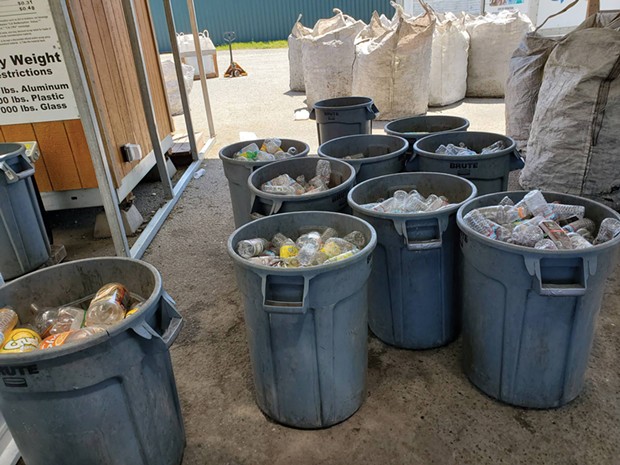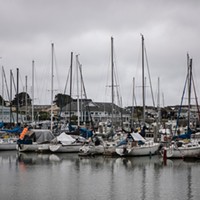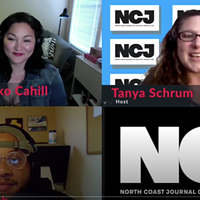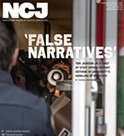Wednesday, December 1, 2021
Assembly Bill 1311 Brings New Hope to CRV Recycling for Rural Areas
Posted By Iridian Casarez on Wed, Dec 1, 2021 at 6:19 AM
California rural counties will have new tools to make California Redemption Value (CRV) recycling easier now that Gov. Gavin Newsom has signed North Coast Assemblymember Jim Wood’s CRV bill.
AB1311 makes changes to the state's recycling law to better meet the CRV recycling demands of California’s rural counties by allowing CRV redemption centers to operate by appointments, when necessary, and introduce bag-drop off CRV recycling as well as allowing those centers to operate for less than 30 hours per week, options previously not allowed under California's Bottle Bill.
The bill comes as Humboldt County has spent over a year without a certified CRV redemption center after the Humboldt Waste Management Authority shuttered its CRV services following an overwhelming demand that caused traffic hazards on Broadway in September of 2020.
HWMA went to the California Department of Resources Recycling and Recovery (Cal Recycle) and asked to be allowed to set up appointments to meet the demand but Cal Recycle denied the request because the department only enforces state law and can’t make any exceptions. The state law is extremely strict and, at the time, only allowed for walk-in CRV drop-offs.
When the county lost its last CRV redemption center, the responsibility fell to grocers to collect, store, transport and redeem the 5 to 10 cent deposits paid by customers at the time of purchase, regardless of the original buying location.
“The bottle bill is really prescriptive and (doesn’t allow for) a whole lot of flexibility, and Humboldt County is like the cradle of the recycling movement in California," Wood told the Journal. "The Arcata Recycling Center started there, my predecessor was a part of the effort, they go way way back, and then, suddenly, we found ourselves in this situation where we don’t have a single recycling center that's available to take redemptions back. It's been a gradual erosion of the financial viability of recycling in California.
“The Bottle Bill is complicated, there are big dollars at stake for some people and for (Humboldt) retailers and folks that are trying to do the right thing to get that redemption back that they paid, it’s really frustrating that there aren’t any facilities to accept it,” he says.
Under the Bottle Bill, if grocers and retailers don’t or can’t collect CRV containers they must pay a fee of $100 per day, adding up to $3,000 per month and $36,000 a year. For small business retailers, $36,000 a year is a large sum. So, despite being listed under Cal Recycle’s in-store redemption list, some retailers chose not to redeem recycling while others limited the days, times and the number of containers they could redeem — all going against the state law which requires stores not limit the number of containers nor the times that CRV redemption services are open.
But even before the closure of HWMA’s CRV services, the Bottle Bill hadn’t been feasible for rural counties due to the high transportation costs and the low value of commodities. The Bottle Bill formula for state subsidies is one-size-fits-all and HWMA was not receiving enough money from the CRV recycling market to make up for the low Cal Recycle subsidies, so it offset the costs with a different service fee, which was the only way the CRV redemption services stayed open at the time.
Although the Bottle Bill isn’t working for rural areas, it’s making the CRV recycling market thrive in more urban areas like Los Angeles. So when Wood went to the Legislature to make a few changes, there were substantive stakeholders who wanted to maintain the status quo. He described the process as David fighting Goliath.
“This is the first time that I have ever delved into this arena myself but there are major players in the recycling movement. … [Urban areas] really don’t want anything changed because it works well for them but when you get out into smaller counties that are rural counties, it doesn’t work at all," Wood said. "And so, that’s when you do feel like your David and anytime you try to make a little change you get the big guy’s attention and that can put a target on you and, fortunately, that didn’t happen, and it was pretty clear what we were trying to do."
Wood met with Humboldt County grocers, retailers and HWMA to evaluate what the county needed, with his main focus on meeting the CRV recycling needs of Humboldt and other rural counties, making sure that he’d be able to help his district while not making drastic changes that would affect the entire market, and that’s how he promoted the bill: as a very small change — which he says is the only reason the bill stayed alive and passed.
In an email to the Journal, Lance Klug, spokesperson for Cal Recycle, said the agency had already begun implementation planning when the governor signed the bill into law on Oct. 5 but it may take a while for the policies to go into effect.
However, HWMA, Recology and Humboldt Sanitation aren’t planning to resume CRV services for a number of reasons, including the fact CRV recycling still isn’t as feasible and because Hambro Recycling of Crescent City is in the process of opening a CRV redemption center in Arcata and wanted to meet the demand.
In an email to the Journal, Humboldt Sanitation general manager Tasha Eisner said if one day they do resume CRV services, they would use most of the provisions allowed by AB1311.
“The passing of AB1311 is good news, allowing recycling centers to operate with some flexibility, which they were not allotted in the past. ... We are a small site, and even during pre-COVID times, we would be overwhelmed at times with the number of customers arriving for CRV services. These provisions would help to ease some of those constraints,” she wrote.
The same goes for Recology.
Linda Wise, general manager at Recology, said hopefully, sometime in the future, it will open the Redway CRV redemption center using AB1311 policies.
Meanwhile, the opening of Hambro Recycling's site in Arcata has been postponed until at least March.
The Arcata Community Development Department has passed Hambro's minor use permit on to the City Planning Commission for approval at its Dec. 14 planning commission meeting. If approved, there is still another hurdle.
Once the permit is OK'd by the city, the process goes to the California Coastal Commission for a coastal development permit, as the property the CRV buyback center will sit on (on South G Street) is under Coastal Commission zoning.
David Loya, director of the Arcata Community Development Department, told the Journal the city has no control over the coastal commission process but hopes the agency can expedite the permitting so Hambro can open its Arcata site sooner rather than later, adding the center is "a real need."
In a press release sent by Hambro Recycling, the company states that it's not expected to open until next year. "Hambro continues to stand ready to open the project but may have to wait until March for final clearance from local and state agencies," the release reads.
If all else fails with the opening of Hambro's CRV buyback center, the county is in a better place to open a CRV buyback center using the provisions of AB1311.
“My hope is that Hambro is successful, I know they’re going through the channels and the paperwork and nothing's a done deal until it’s a done deal. And so, if they are able to open and be successful and they take the pressure off the system, then maybe those tools (in AB1311) aren’t as necessary now but markets change, conditions change and those are tools that were identified by stakeholders as valuable tools and maybe they’ll be deployed at a later day, but at least now we have tools before us that we never had before,” Wood said.
AB1311 makes changes to the state's recycling law to better meet the CRV recycling demands of California’s rural counties by allowing CRV redemption centers to operate by appointments, when necessary, and introduce bag-drop off CRV recycling as well as allowing those centers to operate for less than 30 hours per week, options previously not allowed under California's Bottle Bill.
The bill comes as Humboldt County has spent over a year without a certified CRV redemption center after the Humboldt Waste Management Authority shuttered its CRV services following an overwhelming demand that caused traffic hazards on Broadway in September of 2020.
HWMA went to the California Department of Resources Recycling and Recovery (Cal Recycle) and asked to be allowed to set up appointments to meet the demand but Cal Recycle denied the request because the department only enforces state law and can’t make any exceptions. The state law is extremely strict and, at the time, only allowed for walk-in CRV drop-offs.
When the county lost its last CRV redemption center, the responsibility fell to grocers to collect, store, transport and redeem the 5 to 10 cent deposits paid by customers at the time of purchase, regardless of the original buying location.
“The bottle bill is really prescriptive and (doesn’t allow for) a whole lot of flexibility, and Humboldt County is like the cradle of the recycling movement in California," Wood told the Journal. "The Arcata Recycling Center started there, my predecessor was a part of the effort, they go way way back, and then, suddenly, we found ourselves in this situation where we don’t have a single recycling center that's available to take redemptions back. It's been a gradual erosion of the financial viability of recycling in California.
“The Bottle Bill is complicated, there are big dollars at stake for some people and for (Humboldt) retailers and folks that are trying to do the right thing to get that redemption back that they paid, it’s really frustrating that there aren’t any facilities to accept it,” he says.
Under the Bottle Bill, if grocers and retailers don’t or can’t collect CRV containers they must pay a fee of $100 per day, adding up to $3,000 per month and $36,000 a year. For small business retailers, $36,000 a year is a large sum. So, despite being listed under Cal Recycle’s in-store redemption list, some retailers chose not to redeem recycling while others limited the days, times and the number of containers they could redeem — all going against the state law which requires stores not limit the number of containers nor the times that CRV redemption services are open.
But even before the closure of HWMA’s CRV services, the Bottle Bill hadn’t been feasible for rural counties due to the high transportation costs and the low value of commodities. The Bottle Bill formula for state subsidies is one-size-fits-all and HWMA was not receiving enough money from the CRV recycling market to make up for the low Cal Recycle subsidies, so it offset the costs with a different service fee, which was the only way the CRV redemption services stayed open at the time.
Although the Bottle Bill isn’t working for rural areas, it’s making the CRV recycling market thrive in more urban areas like Los Angeles. So when Wood went to the Legislature to make a few changes, there were substantive stakeholders who wanted to maintain the status quo. He described the process as David fighting Goliath.
“This is the first time that I have ever delved into this arena myself but there are major players in the recycling movement. … [Urban areas] really don’t want anything changed because it works well for them but when you get out into smaller counties that are rural counties, it doesn’t work at all," Wood said. "And so, that’s when you do feel like your David and anytime you try to make a little change you get the big guy’s attention and that can put a target on you and, fortunately, that didn’t happen, and it was pretty clear what we were trying to do."
Wood met with Humboldt County grocers, retailers and HWMA to evaluate what the county needed, with his main focus on meeting the CRV recycling needs of Humboldt and other rural counties, making sure that he’d be able to help his district while not making drastic changes that would affect the entire market, and that’s how he promoted the bill: as a very small change — which he says is the only reason the bill stayed alive and passed.
In an email to the Journal, Lance Klug, spokesperson for Cal Recycle, said the agency had already begun implementation planning when the governor signed the bill into law on Oct. 5 but it may take a while for the policies to go into effect.
However, HWMA, Recology and Humboldt Sanitation aren’t planning to resume CRV services for a number of reasons, including the fact CRV recycling still isn’t as feasible and because Hambro Recycling of Crescent City is in the process of opening a CRV redemption center in Arcata and wanted to meet the demand.
In an email to the Journal, Humboldt Sanitation general manager Tasha Eisner said if one day they do resume CRV services, they would use most of the provisions allowed by AB1311.
“The passing of AB1311 is good news, allowing recycling centers to operate with some flexibility, which they were not allotted in the past. ... We are a small site, and even during pre-COVID times, we would be overwhelmed at times with the number of customers arriving for CRV services. These provisions would help to ease some of those constraints,” she wrote.
The same goes for Recology.
Linda Wise, general manager at Recology, said hopefully, sometime in the future, it will open the Redway CRV redemption center using AB1311 policies.
Meanwhile, the opening of Hambro Recycling's site in Arcata has been postponed until at least March.
The Arcata Community Development Department has passed Hambro's minor use permit on to the City Planning Commission for approval at its Dec. 14 planning commission meeting. If approved, there is still another hurdle.
Once the permit is OK'd by the city, the process goes to the California Coastal Commission for a coastal development permit, as the property the CRV buyback center will sit on (on South G Street) is under Coastal Commission zoning.
David Loya, director of the Arcata Community Development Department, told the Journal the city has no control over the coastal commission process but hopes the agency can expedite the permitting so Hambro can open its Arcata site sooner rather than later, adding the center is "a real need."
In a press release sent by Hambro Recycling, the company states that it's not expected to open until next year. "Hambro continues to stand ready to open the project but may have to wait until March for final clearance from local and state agencies," the release reads.
If all else fails with the opening of Hambro's CRV buyback center, the county is in a better place to open a CRV buyback center using the provisions of AB1311.
“My hope is that Hambro is successful, I know they’re going through the channels and the paperwork and nothing's a done deal until it’s a done deal. And so, if they are able to open and be successful and they take the pressure off the system, then maybe those tools (in AB1311) aren’t as necessary now but markets change, conditions change and those are tools that were identified by stakeholders as valuable tools and maybe they’ll be deployed at a later day, but at least now we have tools before us that we never had before,” Wood said.
Speaking of...
Readers also liked…
more from the author
-
An Upstream Intervention
Open Door hopes state grant will help address impacts of childhood trauma
- Feb 9, 2023
-
Humboldt County Still Working to Implement Organic Waste System
- Feb 2, 2023
-
Earl Robert Bootier: 1945-2022
- Jan 25, 2023
- More »



































